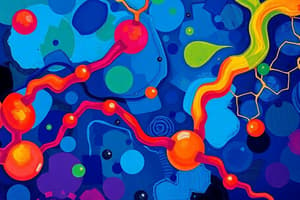Podcast
Questions and Answers
What is the consequence of protein kinase A phosphorylating glycogen synthase kinase-3 (GSFK)?
What is the consequence of protein kinase A phosphorylating glycogen synthase kinase-3 (GSFK)?
- Suppresses glycogen synthase activity (correct)
- Increases glycogen synthase activity
- Promotes glycolytic pathway
- Activates glycogen synthase
What is the ultimate product formed from the conversion of glycogen into glucose-1-phosphate?
What is the ultimate product formed from the conversion of glycogen into glucose-1-phosphate?
- Glucose-1-phosphate (correct)
- Fructose-1,6-bisphosphate
- Acetyl-CoA
- Glucose-6-phosphate
Which hormones stimulate glycogenolysis through interactions with specific receptors on hepatocytes and myocytes?
Which hormones stimulate glycogenolysis through interactions with specific receptors on hepatocytes and myocytes?
- Epinephrine, norepinephrine, and cortisol (correct)
- Insulin and glucagon
- Testosterone and estrogen
- Aldosterone and antidiuretic hormone
What facilitates the conversion of excess glucose in the liver into glycerol and fatty acids?
What facilitates the conversion of excess glucose in the liver into glycerol and fatty acids?
In diabetes mellitus, what may contribute to altered blood sugar control?
In diabetes mellitus, what may contribute to altered blood sugar control?
What enzyme increases free fatty acid availability from adipose tissue during periods of stress or hunger?
What enzyme increases free fatty acid availability from adipose tissue during periods of stress or hunger?
What effect does AMP have on glycogen synthase activity?
What effect does AMP have on glycogen synthase activity?
What role do ATP and UDPglucose play in glycogen synthase activity?
What role do ATP and UDPglucose play in glycogen synthase activity?
Which process involves the breakdown of glycogen into glucose molecules?
Which process involves the breakdown of glycogen into glucose molecules?
How does insulin influence glycogen synthase activity?
How does insulin influence glycogen synthase activity?
What effect does elevated blood sugar levels have on glycogenesis?
What effect does elevated blood sugar levels have on glycogenesis?
Flashcards are hidden until you start studying
Study Notes
Glycogen Metabolism
Glycogen is a form of stored glucose found primarily in liver cells, muscle tissue, and some other tissues. It plays a crucial role in regulating blood sugar levels by providing energy when needed. Understanding how glycogen metabolism works helps us appreciate its significance in maintaining homeostasis within our bodies. Two key aspects of this process involve the regulation of glycogen synthase and glycogenolysis.
Regulation of Glycogen Synthase
The activity of glycogen synthase can be influenced by various factors, including allosteric control, covalent modification, and hormonal signals. Allosteric inhibition occurs when glycogen synthase binds with AMP, which reduces its activity due to structural changes in the enzyme's active site. On the other hand, ATP and UDPglucose act as activators because they promote conformational changes that enhance the catalytic efficiency of the enzyme. Additionally, phosphorylation and dephosphorylation events controlled by protein kinases and phosphatases also play a significant role in modifying glycogen synthase activity. For instance, insulin promotes dephosphorylation of glycogen synthase, leading to increased enzymatic activity and glycogen synthesis, while elevated blood sugar levels cause glycogenesis to decrease.
Glycogenolysis
This process refers to the breakdown of glycogen into glucose molecules, facilitating their release into the circulatory system for distribution throughout the body. Hormones such as epinephrine, norepinephrine, and cortisol stimulate glycogenolysis through interactions with specific receptors on hepatocytes and myocytes. These hormone actions lead to increased cyclic AMP production, followed by activation of protein kinase A, which in turn phosphorylates glycogen synthase kinase-3 (GSFK) and suppresses glycogen synthase activity. Consequently, glycogen synthase activity decreases, favoring the conversion of glycogen into glucose-1-phosphate via glycosyltransferase reactions. This glucose-1-phosphate can then enter the glycolytic pathway, generating energy in the form of ATP. Simultaneously, the liver converts excess glucose into glycerol and fatty acids, facilitated by hormone sensitive lipase, which increases free fatty acid availability from adipose tissue.
In summary, understanding glycogen metabolism and its complex regulatory mechanisms provides insight into how organisms maintain internal stability during periods of stress, hunger, or restitution after physical exercise. Knowledge of these processes has implications in various fields, including human health and disease states like diabetes mellitus, where impaired glycogenesis or excessive glycogenolysis may contribute to altered blood sugar control.
Studying That Suits You
Use AI to generate personalized quizzes and flashcards to suit your learning preferences.




